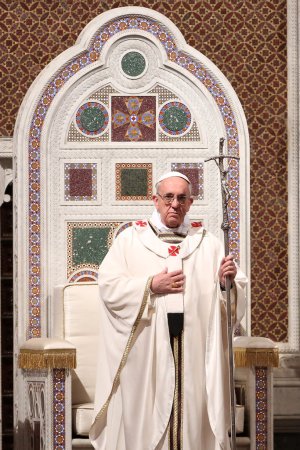*Permission to post in full*
If we believe we have to "honor the Sabbath day," why aren’t Catholics obliged to attend Mass on Saturday instead of Sunday?
@The Liturgist
One of the most appealing teachings of the
Seventh-day Adventist denomination is their insistence that Christians must obey the Ten Commandments . . .
all ten of them. They rightly expose the errant thinking among many Protestant Christian sects that claims, “We don’t have to keep the Ten Commandments for salvation anymore.”
Of course, as Jesus reminds us:
And behold, one came up to him, saying, “Teacher, what good deed must I do, to have eternal life?” And [Jesus] said to him . . . “If you would enter life, keep the commandments” (
Matt. 19:16-17).
Given our agreement on this point, the Seventh-day Adventist commonly asks: “If you believe we have to keep the Fourth (our Third) Commandment, why aren’t Catholics obliged to attend Mass on Saturdays instead of Sunday?”
We can draw our first source from the the
Catechism, which declares:
Since they express man’s fundamental duties towards God and towards his neighbor, the Ten Commandments reveal, in their primordial content, grave obligations. They are fundamentally immutable, and they oblige always and everywhere. No one can dispense from them. The Ten Commandments are engraved by God in the human heart (2072).
Click to expand...
Thus, the Third Commandment is “fundamentally immutable” because it’s one of the Ten Commandments, which Jesus said we must follow to attain everlasting life. However, the Catholic Church teaches the particular day we celebrate in keeping the Third Commandment to be
ceremonial, or an
accidental component of the law that is changeable. Here’s how the
Catechismputs it:
Sunday is expressly distinguished from the Sabbath which it follows chronologically every week; for Christians its ceremonial observance replaces that of the Sabbath. In Christ’s Passover, Sunday fulfills the spiritual truth of the Jewish Sabbath. . . . Those who lived according to the old order of things have come to a new hope, no longer keeping the Sabbath, but the Lord’s Day. . . . The celebration of Sunday observes the moral commandment inscribed by nature in the human heart to render to God an outward, visible, public, and regular worship. . . . Sunday worship fulfills the moral command of the Old Covenant, taking up its rhythm and spirit in the weekly celebration of the Creator and Redeemer of his people (2175-76).
Click to expand...
Are there biblical data that concur with this teaching of the Church? Absolutely!
St. Paul tells us that the ceremonial aspect of the old law—
the Sabbath day itself—is no longer binding for the Christian faithful:
Therefore let no one pass judgment on you in regard to food or drink or in respect to festival, or a new moon or a Sabbath day—things which are a mere shadow of what is to come, but the substance belongs to Christ (
Col. 2:16-17).
Clearly, the Sabbath is “a mere shadow”—that is, fleeting by nature. And “shadow” (Greek,
skian) is the same word used by the inspired author of the letter to the Hebrews for the animal sacrifices of the Old Covenant—also no longer binding on Christians.
For the law, having but a shadow (Greek, skian) of the good things to come, and not the exact image of the objects, is never able by the sacrifices which they offer continually, year after year the same, to perfect those who draw near (10:1).
Moreover, it is important to note how Paul uses the same division of “festivals” (annual holy days), “new moons” (monthly holy days), and “Sabbaths” (the weekly holy days) that the Old Testament uses in
1 Chronicles 23:31;
2 Chronicles 2:4,
8:12-13,
31:3; and elsewhere, when referencing Jewish holy days. Clearly, along with the yearly and monthly holy days—which no Christian today claims is binding upon believers in Christ—the Sabbath is included in what Paul calls a mere
shadow.
When Paul teaches that Christians do not have to keep the Sabbath, he speaks of the holy days that were specific
to the Jews. He is not saying—and does not say—that we do not have to keep
any holy days at all. In context, Paul is dealing with Judaizers, who were telling Gentile Christians they had to be circumcised and keep the Old Covenant law that had passed away, which would include the Sabbath and other holy days, in order to be saved. Some overlook this fact when they use Paul’s epistle to the Romans against the necessity of keeping the Third Commandment.
As for the man who is weak in faith, welcome him, but not for disputes over opinions. One believes he may eat anything, while the weak man eats only vegetables. . . . One man esteems one day as better than another, while another man esteems every day alike. Let every man be fully convinced in his own mind. He who observes the day, observes it in honor of the Lord. He also who eats, eats in honor of the Lord (14:1-6).
Click to expand...
During the first few decades of Church history, the question of Jewish-Gentile relations with the Church and the law was a hot topic. As long as the Temple was standing, Christians of Jewish descent were free to attend the Temple and keep certain aspects of the Old Law, as long as they did not teach these things to be
essential for salvation.
Many will claim the Catholic is in grave error here because
Hebrews 4:9 declares: “So then, there remains a Sabbath rest for the people of God.” And a surface reading here does appear to bind Christians to the seventh day. However, the context within verses 4-8 greatly clarifies things for us:
For he has somewhere spoken of the seventh day in this way, “And God rested on the seventh day from all his works.” And again in this place he said, “They shall never enter my rest.” Since therefore it remains for some to enter it, and those who formerly received the good news failed to enter because of disobedience, again he sets a certain day, “Today,” saying through David so long afterward, in the words already quoted, “Today, when you hear his voice, do not harden your hearts.” For if Joshua had given them rest, God would not speak later of another day. So, then, there remains a Sabbath rest for the people of God; for whoever enters God’s rest ceases also from his labors as God did from his.
Click to expand...
The context makes clear that the Jewish “seventh day” has been superseded, or, more properly, fulfilled, in “another day,” “a certain day,” that is a new “Sabbath rest for the people of God.” What day is this? In Hebrews, it is not so much a day at all as it is
a person: Jesus Christ. In fact, the entire discussion of “the Sabbath rest” disappears into the discussion of our “great high priest who has passed through the heavens, Jesus, the Son of God” (4:14ff). It is Jesus Christ himself who actualizes the “rest” that was merely foreshadowed by the Sabbath.
“End of discussion,” say our Protestant friends.“There is no longer any such thing as a day that binds Christians in the New Covenant. Jesus is the fulfillment of the Sabbath, not some day we have to go to church.” And they are actually correct, but only
partially. Jesus is the fulfillment of the Sabbath rest in the sense that only he can actualize the “rest” the Sabbath symbolized.
In
Hebrews 10:1-26, we see movement toward tagging on
the Church as fulfillment of all that was merely
shadow in the Old Covenant and not just Jesus Christ in the abstract. And this makes sense only when we understand that “the Church” is
the body of Christ, or Christ himself extended into the world (cf.
Eph. 1:22-23).
For since the law has but a shadow of the good things to come, instead of the true form of those realities, it can never . . . make perfect those who draw near.
Therefore, brethren, since we have confidence to enter the sanctuary by the blood of Jesus, by the new and living way which he opened for us through the curtain, that is, through his flesh, and since we have a great high priest over the house of God, let us draw near with a true heart in the full assurance of faith, with our hearts sprinkled clean from an evil conscience and our bodies washed with pure water . . . not neglecting to meet together, as is the habit of some. . . . For if we sin deliberately after receiving the knowledge of the truth, there no longer remains a sacrifice for sins (
Heb. 10:1;
19-22,
25-26).
Click to expand...
As Christians, we “enter into the sanctuary” through baptism—
bodies washed with pure water—and the Eucharist—
his flesh—thus enters the necessity of the Church.
So if Christians are bound to keep the third commandment, and it involves “meeting together,” but
not on the Sabbath, what day are we commanded to meet?
In Scripture, whenever we see Christians meeting to worship the Lord, receive Communion, take up collections—apart from the synagogue—it is either “daily,” or especially, it’s “on the first day of the week” (
Acts 20:7;
1 Cor. 16:2). It is true that you often see St. Paul entering into the synagogue on the Sabbath (
Acts 13:14-44,
16:13,
18:4). However, in each instance, his purpose was to proclaim the truth about Christ to the Jews. These are not specifically
Christian gatherings. But notice what we find in
Acts 2:46:
And day by day, attending the temple together and breaking bread in their homes, they partook of food with glad and generous hearts.
Paul and his companions attended the temple, but “the breaking of bread” occurred in the house “churches” of Christians. “The breaking of bread,” by the way, is a Eucharistic phrase in St. Luke’s writings. For example, when Paul was in Troas in
Acts 20:7, we read: “On the first day of the week, when we gathered together to break bread.”
Luke 24:30-31 records that Cleopas and an unnamed disciple’s “eyes were opened,” and they recognized Jesus “in the breaking of the bread.” And according to
Luke 24:1 and
13, this encounter was also on the first day of the week! Paul never says, “On the Sabbath, when we gathered to break bread.” Instead, the “breaking of bread” in Luke 24 and in Acts 20 occurs on the first day of the week.
It’s important to remember that when we talk about biblical “churches,” we mean the designated homes for “church” gatherings and specifically for “the breaking of bread.”
For, in the first place, when you assemble as a church . . . it is not the Lord’s Supper that you eat. For in eating, each one goes ahead with his own meal, and one is hungry and another is drunk. What! Do you not have houses to eat and drink in? Or do you despise the church of God? . . . For I received from the Lord what I also delivered to you, that the Lord Jesus on the night when he was betrayed took bread, and when he had given thanks, he broke it (
1 Cor. 11:18-23).
Click to expand...
So those “homes” were actually house “churches” in which “the breaking of bread” happened, and it happened on
the first day of the week: Sunday.
If we believe we have to "honor the Sabbath day," why aren’t Catholics obliged to attend Mass on Saturday instead of Sunday?

www.catholic.com




















